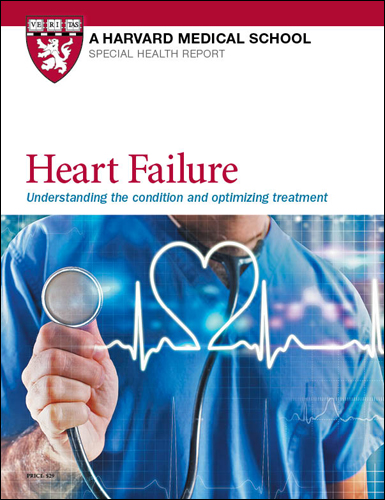Warning signs of early heart failure
Recognizing and treating heart failure sooner rather than later may slow progression of this serious condition.
- Reviewed by Deepak L. Bhatt, M.D., M.P.H, Former Editor in Chief, Harvard Heart Letter

If you start feeling a bit more tired or winded than normal, it's easy to write it off to growing older or being out of shape or overweight. But if these symptoms persist, don't ignore them — especially if you also notice swelling in your ankles and difficulty breathing when you lie down.
These are all classic symptoms of early heart failure, which happens when the heart isn't able to pump effectively enough to deliver blood throughout the body (see "The FACES of heart failure"). Recent developments in both detection and treatment may help ease the burden of heart failure, which is a leading cause of hospitalization in people 65 and older.
In general, people aren't aware that they may be vulnerable to developing heart failure, nor do they appreciate how dangerous it can be. "But we have tools to identify early heart failure in people at the highest risk, such as those with type 2 diabetes," says cardiologist Dr. James Januzzi, professor of medicine at Harvard Medical School.
The FACES of heart failureTo help both patients and doctors quickly spot possible heart failure symptoms, the Heart Failure Society of America came up with a simple acronym: FACES. F.Fatigue. A weakened heart can't deliver enough oxygen-rich blood to meet the body's needs, causing a general sense of feeling tired or fatigued. A.Activity limitation. Because people with heart failure tire easily, they often struggle to do everyday activities such as preparing a meal or taking a short walk. C. Congestion. The heart's poor pumping ability causes blood to back up and fluid to leak into the lungs. The resulting lung congestion can trigger coughing and wheezing. E. Edema or ankle swelling. Excess fluid can also collect in the ankles, legs, thighs, and abdomen. All the extra fluid can also cause rapid weight gain. S. Shortness of breath. Congestion makes it harder for the lungs to remove carbon dioxide and replenish the blood with fresh oxygen, which makes breathing difficult. Shortness of breath is often worse when people lie down because excess fluid from the lower body moves up toward the lungs. |
Blood biomarker testing
Now, new guidelines from the American Diabetes Association recommend that people with type 2 diabetes receive yearly blood tests for brain natriuretic peptide (BNP) or N-terminal pro-brain natriuretic peptide (NT-proBNP). These biomarkers, which heart muscle cells release when under stress, have long been used to diagnose and monitor heart failure. Screening people who are especially vulnerable to heart failure may reveal the problem sooner. And a timely diagnosis means earlier access to the array of potentially helpful therapies, Dr. Januzzi says.
Earlier this year, the FDA approved the expanded use of empagliflozin (Jardiance) for treating people with the most common form of heart failure in older people, known as heart failure with preserved ejection fraction (HFpEF). Originally developed to treat type 2 diabetes, empagliflozin was later found to help keep people with heart failure (even those without diabetes) out of the hospital and alive longer. Another effective heart failure treatment is a combination of two blood pressure drugs (sacubitril and valsartan) called Entresto. Other older, generic drugs such as beta blockers and mineralocorticoid receptor antagonists are also very useful.
Coronary artery disease (a buildup of fatty plaque inside the arteries that supply the heart) is the No. 1 cause of heart failure in the United States. But a study in the March 2022 issue of the Journal of the American College of Cardiology found that only about a third of people who get a diagnosis of heart failure are tested for coronary artery disease within three months. This disappointing trend suggests that people with heart failure are often undertreated, says Dr. Januzzi, who co-authored an editorial accompanying the study.
Take-home advice
Dr. Januzzi urges all his patients to follow the American Heart Association's "Life's Simple 7" heart-healthy habits (see /simple7) to lower their risk of all types of cardiovascular disease. In addition, people with type 2 diabetes should ask about getting a yearly blood natriuretic peptide test to check for early heart failure. Anyone who notices possible heart failure symptoms should be evaluated by a physician. And those found to have heart failure should make sure they're assessed for coronary artery disease, as the findings will affect the treatment they receive.
Image: © Phynart Studio/Getty Images
About the Author

Julie Corliss, Executive Editor, Harvard Heart Letter
About the Reviewer

Deepak L. Bhatt, M.D., M.P.H, Former Editor in Chief, Harvard Heart Letter
Disclaimer:
As a service to our readers, Harvard Health Publishing provides access to our library of archived content. Please note the date of last review or update on all articles.
No content on this site, regardless of date, should ever be used as a substitute for direct medical advice from your doctor or other qualified clinician.
















